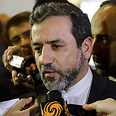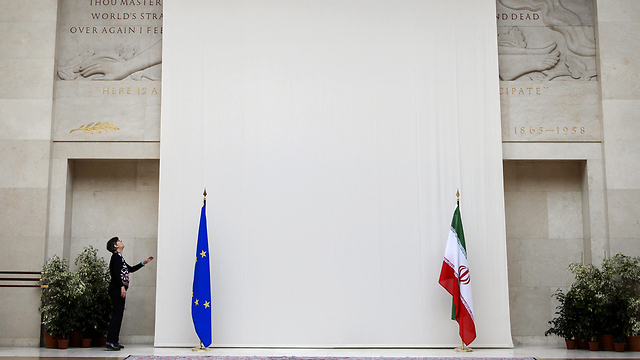
Iranian journalists sense 'change,' but say sanctions must be eased
Reporter covering nuclear talks in Geneva tells Ynet 'Rohani really is different, but life in Tehran difficult due to economic situation.' Swiss cover up relief carving of naked man so as not to offend Iranian delegation
GENEVA – Iran and the six world powers concluded the first day of the current round of nuclear negotiations with cautious optimism. Iran's representatives outlined a proposal on Tuesday on resolving the decade-old standoff over its nuclear program, but both sides at the talks warned it was too early to say if a breakthrough was within reach.
One of the 31 Iranian journalists covering the negotiations in Geneva told Ynet that "life in Tehran is very different since the (economic) sanctions were tightened. People sense the change since the election of President (Hassan) Rohani, but this trend will not continue without economic change and the easing of sanctions."
Related stories:
- 'Death to America' chants in Tehran
- Expert: Iran plays brilliant chess game
- Iran cancels anti-Zionism conference
The reporter said the Iranians voted to "bring a change to their lives. Life under the sanctions is difficult. Rohani really is different. He talks to the world in a language that is different than (his predecessor Mahmoud) Ahmadinejad and he is really trying to effect change."
He said that the Iranian journalists who accompanied their country's delegation to the talks represent media outlets from the entire political spectrum, including outlets that are affiliated with the reformists.
Covered relief carving of naked man (Photo: AFP)
The Iranian journalists are closely following Benjamin Netanyahu's statements. A veiled female reporter mentioned the Israeli prime minister's claim that Iranians are forbidden from wearing jeans. "Today I am not wearing jeans, but I have some pairs in my closet. The Iranian nation chose Rohani in free elections. We really hope change will come."
The reporter said the Iranian people believe the Islamic Republic's nuclear program is intended for civilian purposes and that the regime is not interested in developing nuclear weapons.
The chief US negotiator at the talks held a rare bilateral discussion with Tehran's delegates, described by a senior US official as "useful."
Video courtesy of jn1.tv
The talks between Iranian Deputy Foreign Minister Abbas Araqchi and US Undersecretary of State Wendy Sherman were the third bilateral contact between the two nations since Rohani's election in June. They followed a telephone call between Rohani and President Barack Obama last month, the highest level US-Iranian contact since Iran's Islamic Revolution in 1979.
Araqchi said after Iran presented its proposal that it was capable of achieving a breakthrough in the deadlock following years of on-and-off negotiations. But he later said it was not possible to tell whether progress was being made. "It's too soon to judge," he told Reuters.
Iran has for years demanded the West lift the sanctions on its oil and banking sector and recognize its right to enrich uranium before it makes any concessions on the work.
Araqchi was quoted as saying by the ISNA news agency that Iran had reiterated these demands in the new proposal, but he added that details were "confidential".
Western diplomats have complained in the past that Tehran has refused to offer sufficient nuclear concessions to warrant a deal. But both sides signaled that the atmosphere, at least, in Tuesday's initial session of talks was positive.
"They went well," Araqchi said. "We had a very constructive, very good exchange of views, very serious. It was, I can say, very businesslike."
The Swiss are making every effort to make the Iranian diplomats feel comfortable, and even went as far as covering up a relief carving of a naked man at the UN's Geneva headquarters.
UN officials would not comment on why the wall relief, inspired by Michelangelo's "Creation of Adam," had been masked by a large white screen, referring questions to the Swiss authorities.
But Swiss newspaper Tribune de Geneve claimed that the aim was to avoid offending the Islamic republic's delegation for the talks.
Donated by Britain to the UN's forerunner the League of Nations in 1938, the larger-than-life reclining figure was sculpted by Eric Gill, and tops the entrance to the building's Council Chamber where the talks are taking place.
Reuters, AFP contributed to the report
Lior Zilberstein is Ynet and Yedioth Ahronoth's correspondent in Geneva
- Receive Ynetnews updates directly to your desktop











